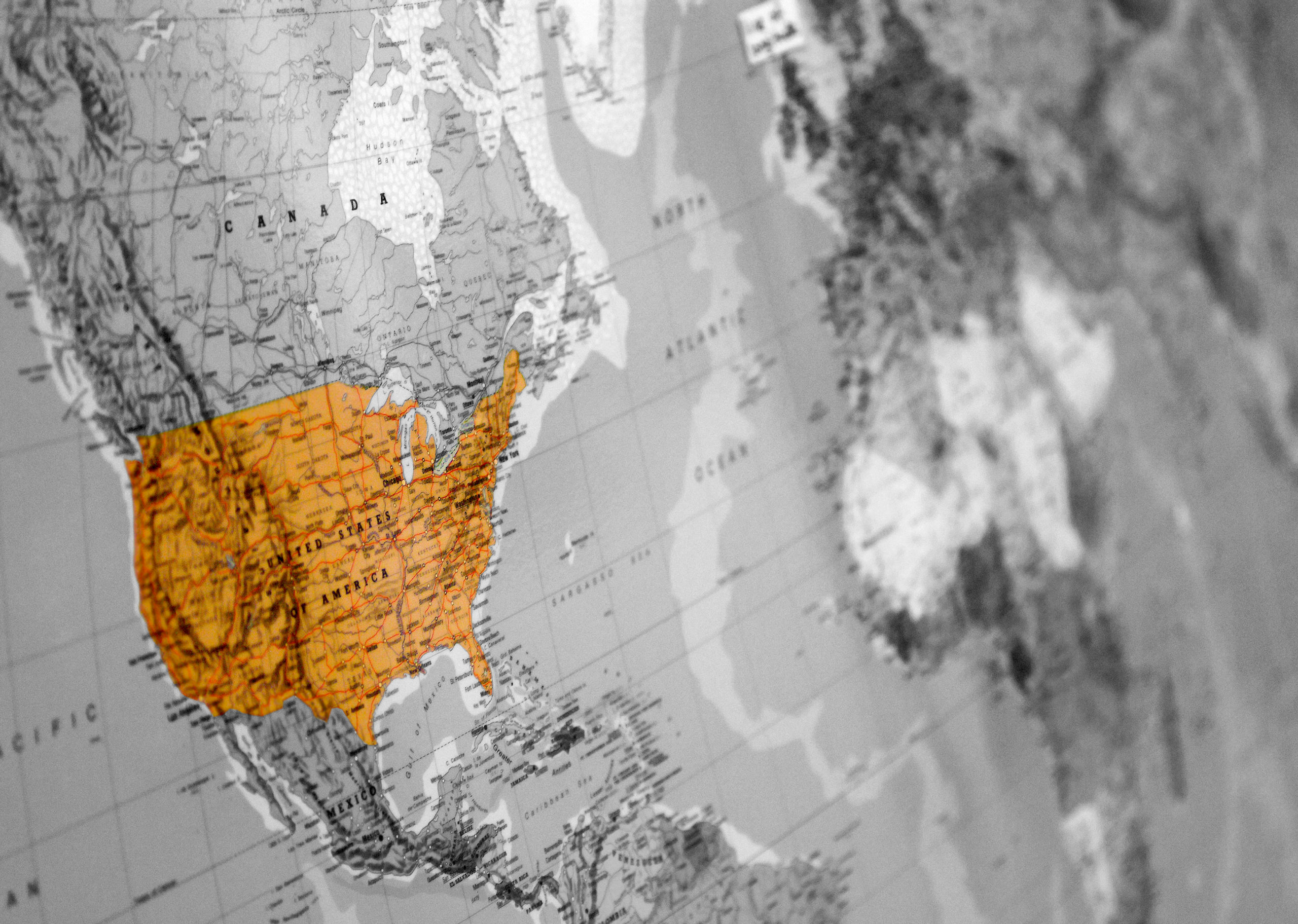Topic 1: Do people believe that the “America First” foreign policy is putting the American people first, or not? For many Americans, the biggest problem is that America First may eventually mean America Alone.
Topic 2: What are Americans struggling to afford in today’s economy, and what do they want their political leaders to do about it? The national economy may be continuing to grow, but many are finding it more difficult to afford the essentials, especially health care. Americans want more to be done to keep prices down, and see Democrats in Congress as more likely to stand up for consumers.
Topic 3: Where is the public on the crisis of family separation at the U.S.-Mexico border? The Trump Administration policy of taking children from their parents is overwhelmingly unpopular. More than just opposed, many Americans think the policy is “cruel” and “inhumane.”
1 | America First?
The American people are concerned about America First. They worry that it may really mean Trump First and America Alone.
NOTE TO OUR READERS: This poll was conducted prior to the recent Trump-Putin meeting and should be interpreted with that in mind.
Americans are uneasy about the White House’s foreign policy decisions – and the president’s decision-making process.
Fully two thirds (68%) are concerned about how American foreign policy and our role in the world is changing. Democrats are universally concerned (97%), but foreign policy is also one area where a significant number of Republicans (37%) express concerns about Trump.
The driving concern about American foreign policy today is Trump. He’s not perceived as steering with a steady hand. When it comes to keeping America safe, the big problem is that the President is so prone to go off script: it’s the impulsiveness of the president that concerns people most about the administration, and the way it is eroding the country’s standing in the world, particularly with our allies.
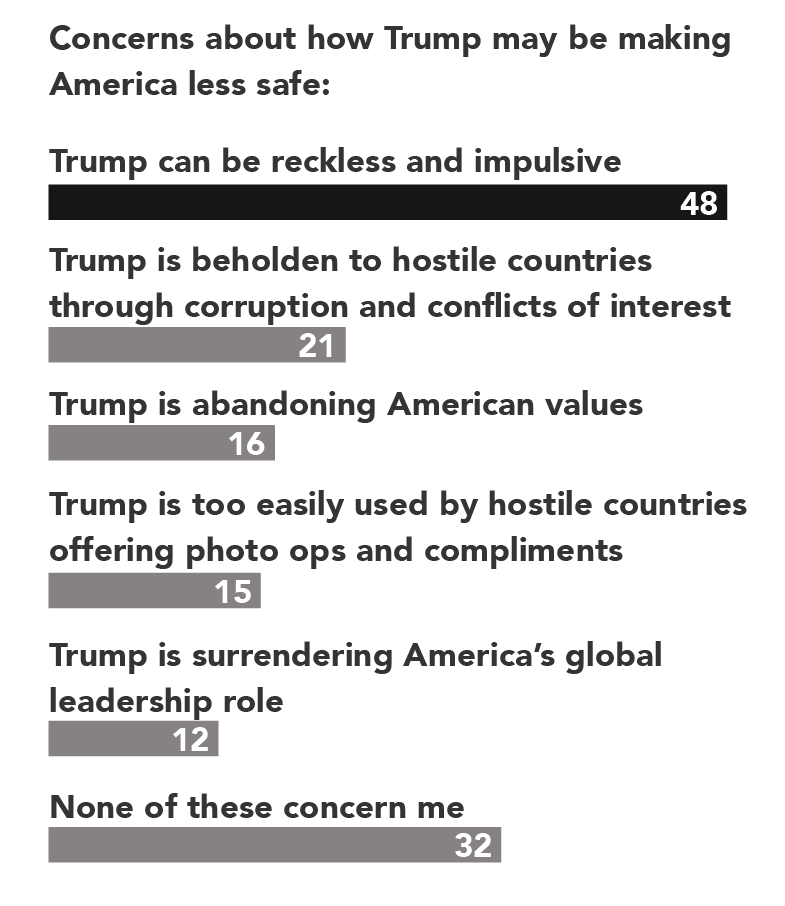
The result? The public is becoming concerned that America is viewed around the world as an embarrassment and a nation abandoning our friends.
For the two-thirds concerned about how America’s role in the world is changing, the prospect looms of the country becoming a diminished version of itself.
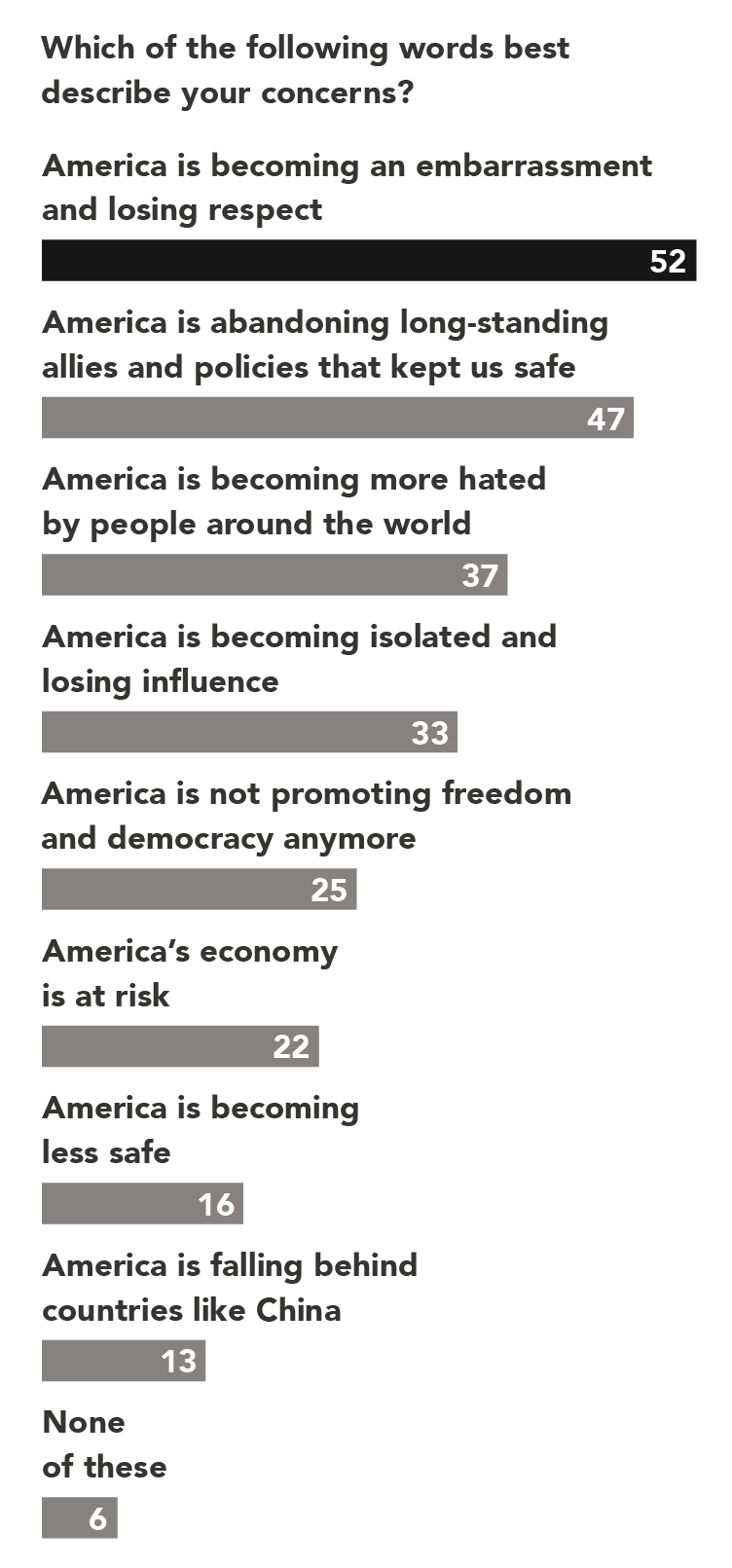
Getting along with others is also among the areas of foreign relations for which Americans feel President Trump compares least favorably to other presidents, though it isn’t as clear Americans think he is making the country more dangerous.
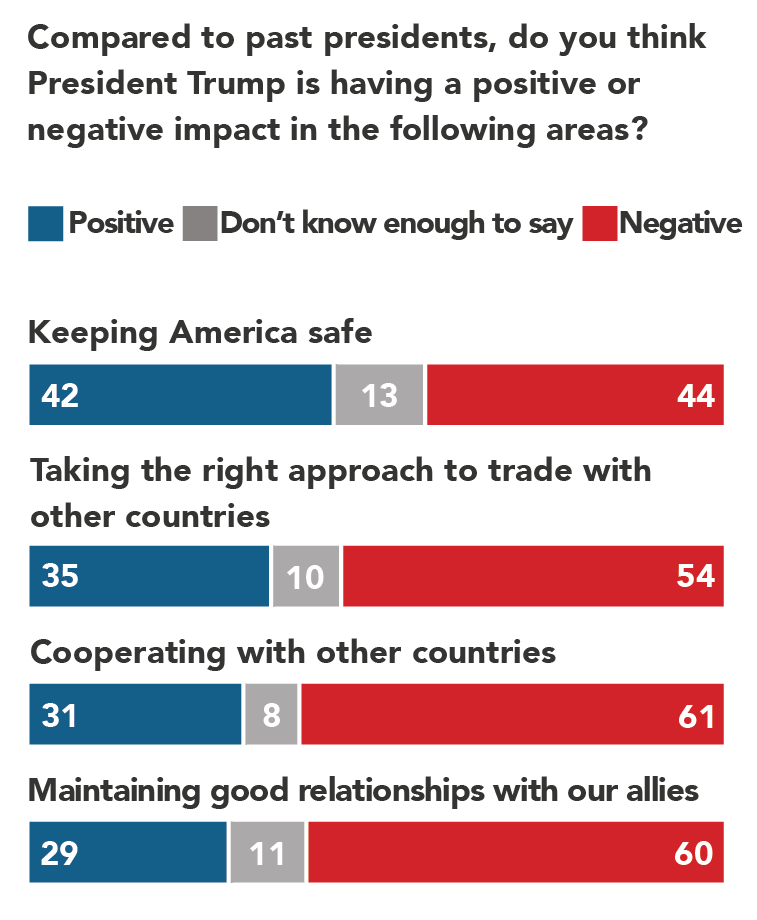
1 | America First?
Americans believe abandoning American values and alliances will risk our national security and economy.
The public does not think America first is working.
On the economic front, this is clearest with the Trump Administration’s trade tariffs. In general, Americans oppose the tariffs by 47% to 38%, and they tend to believe the unnecessary conflicts over trade are causing more economic harm than good.
When it comes to national security, Americans are concerned that the risk of damaged alliances and broken international agreements makes us weaker rather than stronger.
In both cases, the common thread is that Trump’s foreign policy of confrontation and shifting allegiances is not seen as a positive.
Americans have deep concerns over Trump’s positioning with our allies — whether it’s about the economy or national security.
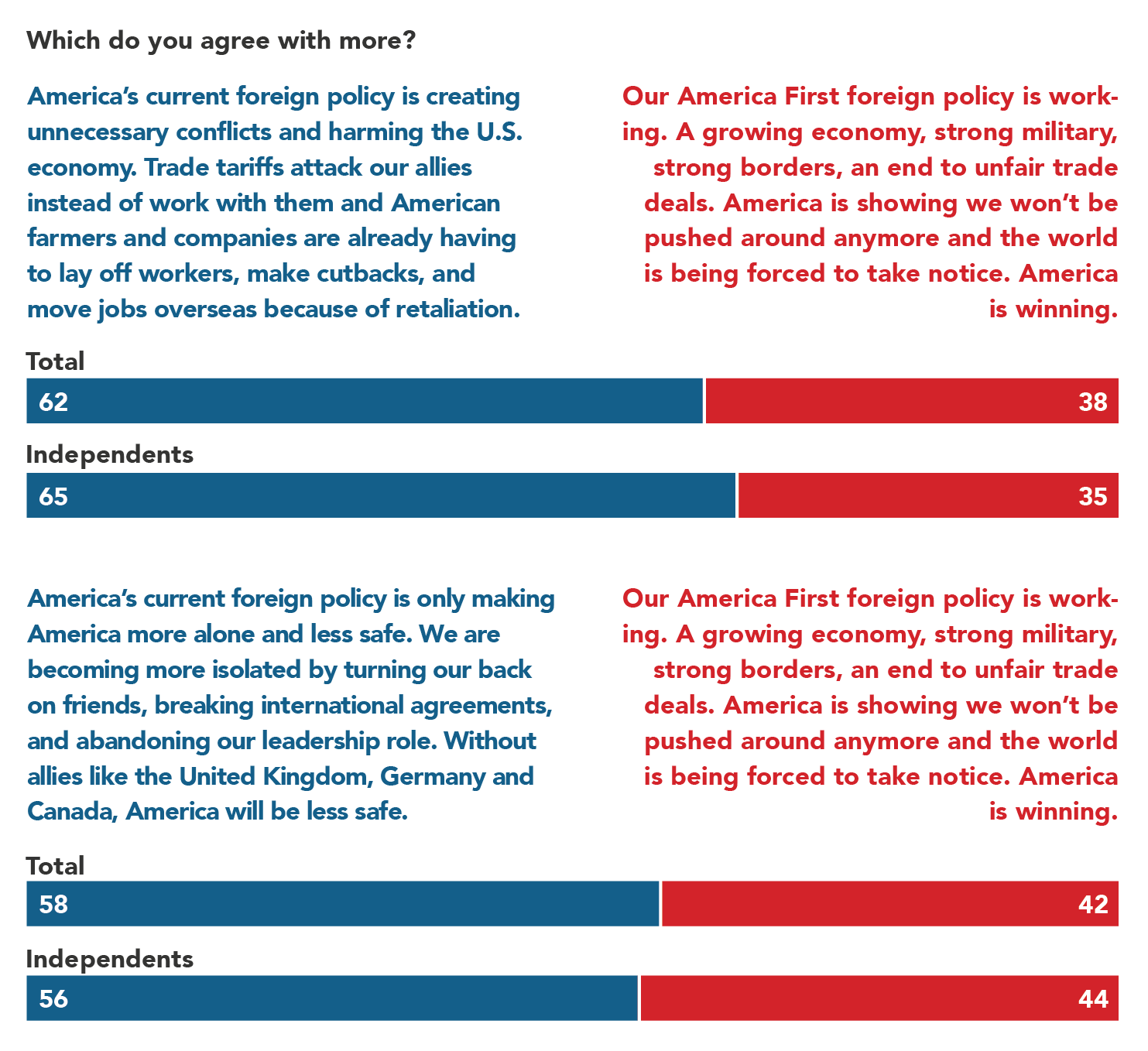
Americans are less worries about losing America’s “world leader” status than they are about losing our moral standing.

In addition to the economic and national security risks, Americans see “America First” as a misnomer. They worry that America’s current foreign policy is putting President Trump himself ahead of the country’s interests, as demonstrated by his attitude towards dictators like Kim Jong-Un of North Korea and Vladimir Putin of Russia.
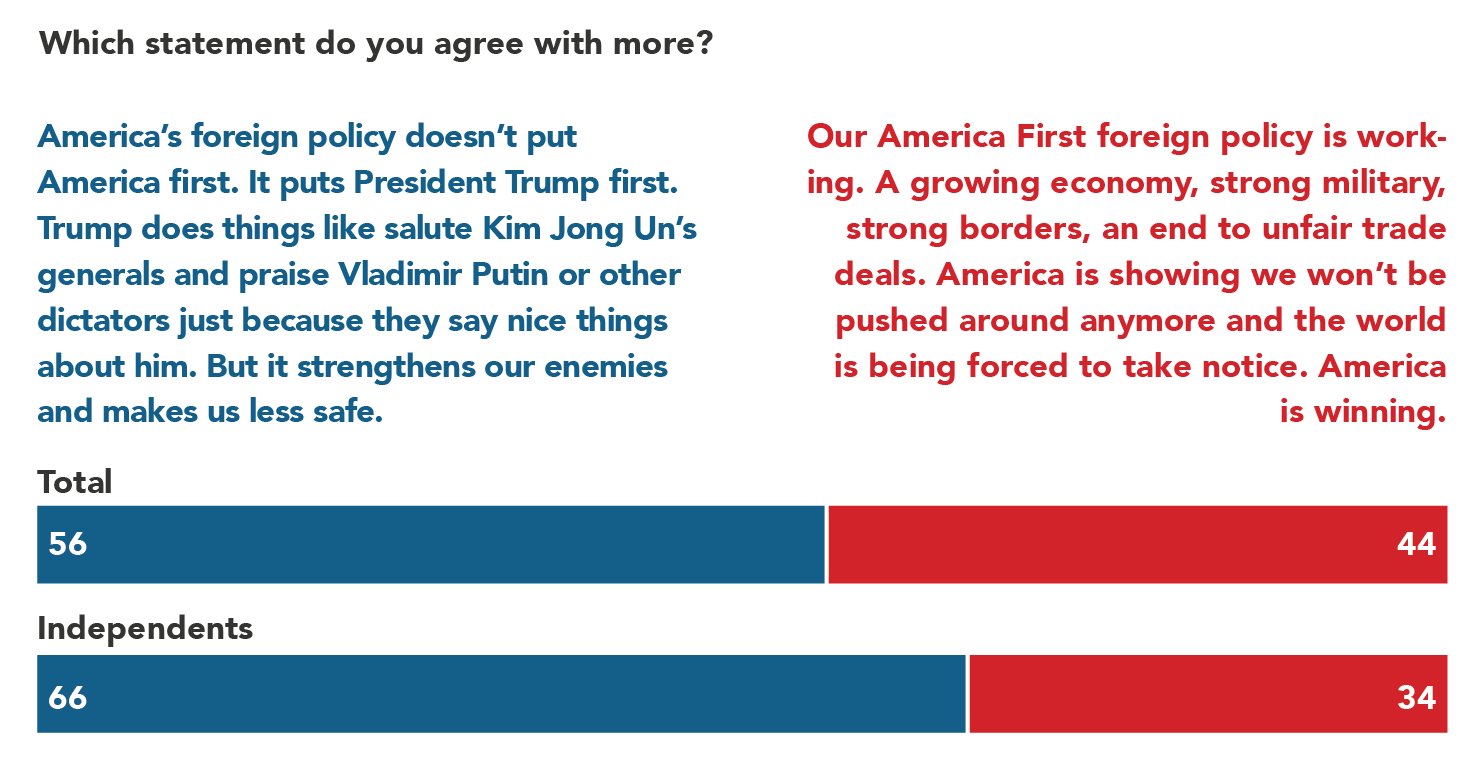
Oh, Canada!
 Of the major U.S. allies with which President Trump has clashed, the world leader Americans worry about confrontation with most is our neighbor to the north.
Of the major U.S. allies with which President Trump has clashed, the world leader Americans worry about confrontation with most is our neighbor to the north.
The world leader Americans are most worried about Trump cozying up to: Vladimir Putin.
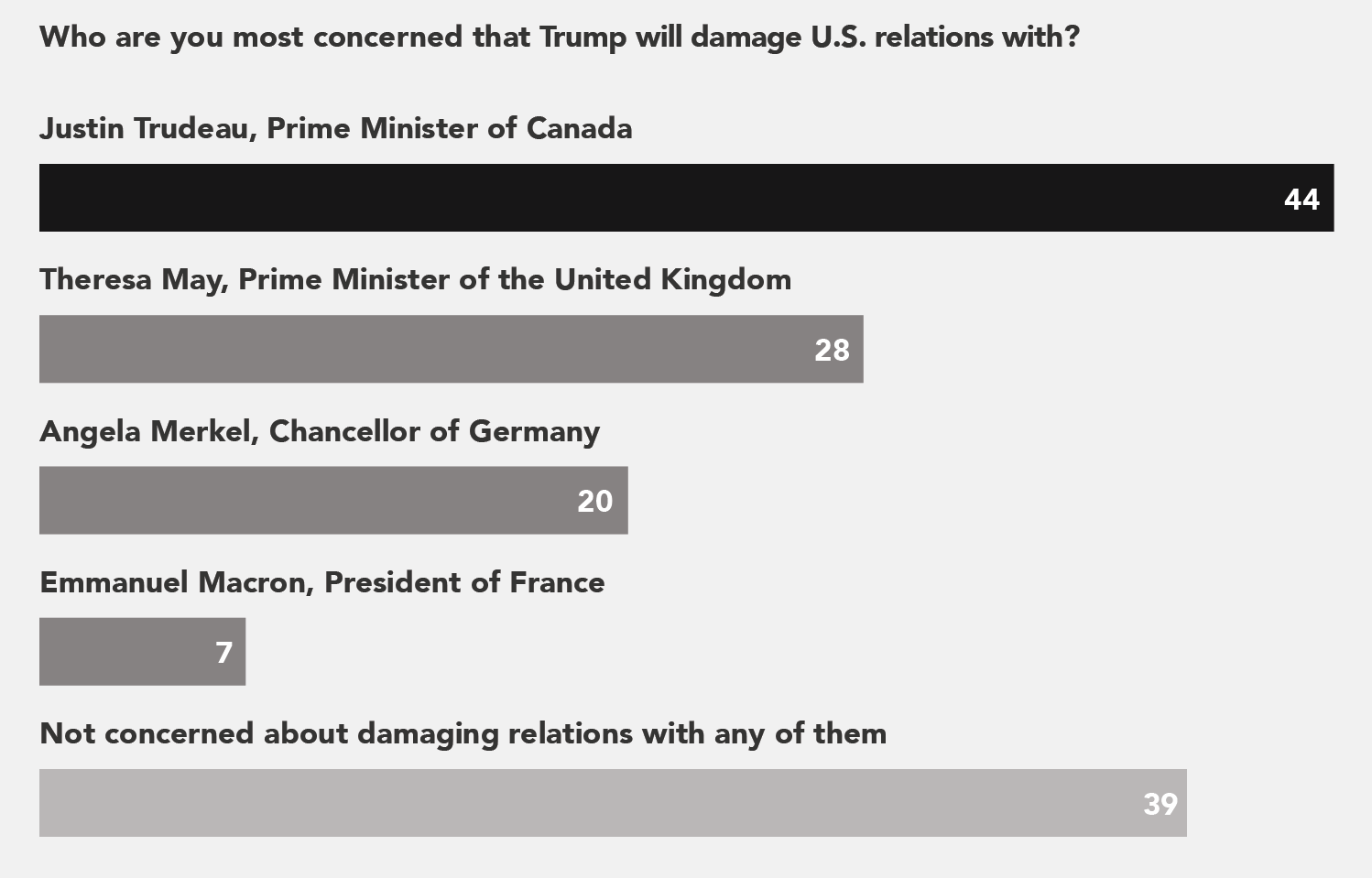
2 | Sticker Shock
Within the economy’s slow but steady recovery is a continued struggle for many Americans to afford the things they need.
While Americans feel the overall economy continues to move in the right direction, they remain worried about their own financial future. This poll digs into one of the other lingering concerns: the cost of things. Statistics show wage growth has yet to take off, and this survey confirms nearly half (45%) of Americans are finding it more difficult to afford things than they were last year, double the amount who are finding it easier (22%) – people don’t believe their lives have become more affordable.
Necessities cause more concern – health care, gas, groceries, and bills. Fully half of Americans are finding it more difficult to afford health care costs, and it rises to the top when people are asked what worries them the most. Nearly as many say gas prices are also becoming less affordable, while a third are worried about groceries or other everyday expenses like phone bills, utilities (like gas, electricity or water), or food and evening entertainment with family.
Americans want the government to do more to fix health care costs and gas prices. Almost eight in ten (78%) say the government should do something about health care costs – compared to just 28% who, for example, say the government should do more to help with credit card bills and debt payment. And while most Americans overall see a role for the government in making utilities, retirement savings, or college more affordable, only for health care and gas prices do majorities of Democrats, Republicans, and political independents all see a role for government in keeping costs down.
Health care, health care, health care.
Health care is one area where Americans say costs are more difficult to manage, and there is a clear expectation for government to step in to help.
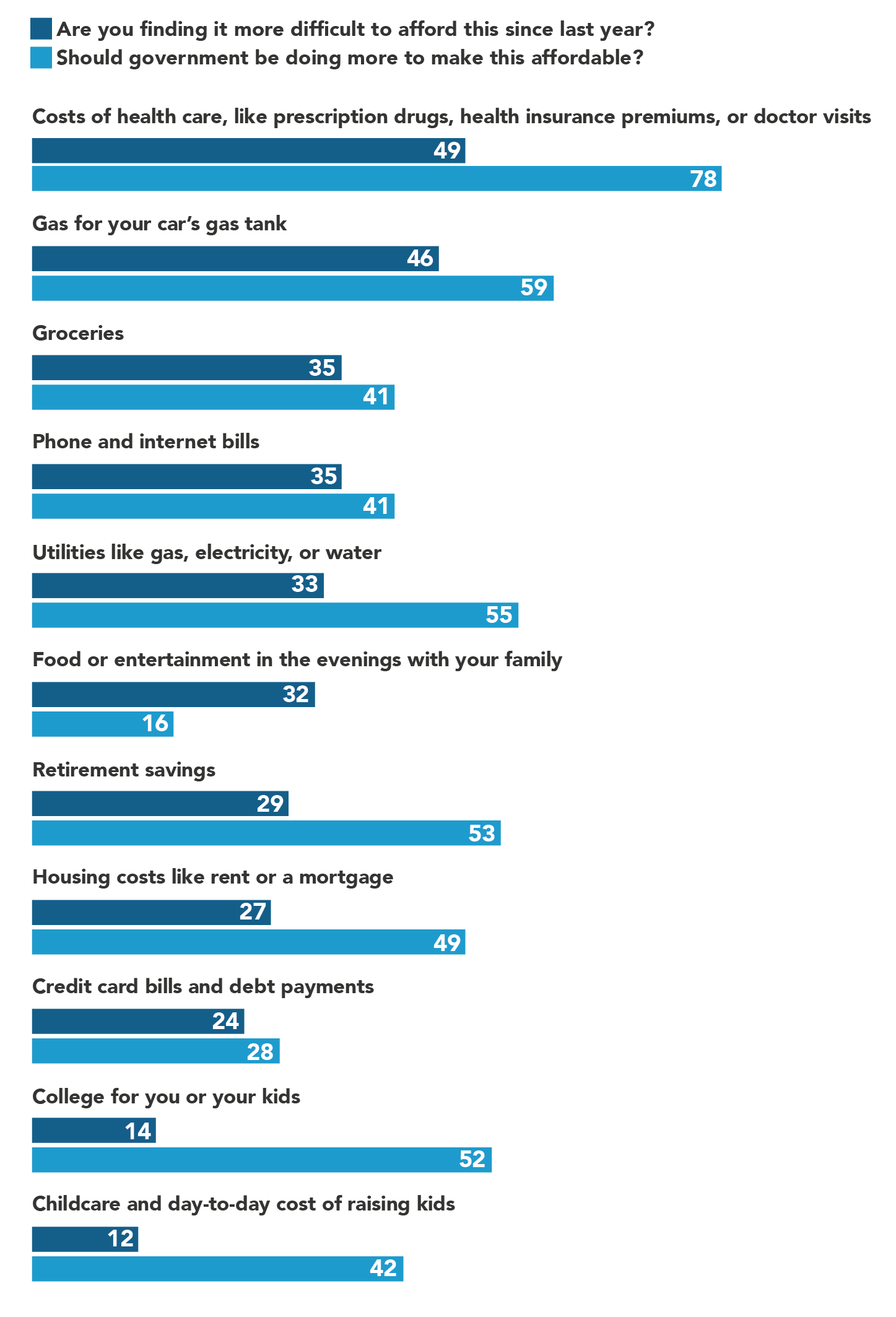
2 | The Politics of Health Care Prices
Americans want something to be done about health care costs. They trust Democrats more to do it.
Health care costs may be a bipartisan problem, but only one party is trusted to be part of the solution. The rising cost of health care shines through as a particular financial challenge for families across the country where people see the need for government action.
While Americans do think government has a role to play, they place the most blame for rising health care costs on insurance companies and drug companies rather than either of the two political parties. But there’s a twist – when asked which party is more likely to let these companies do what they want when it comes to prices, they are more likely to name Republicans over Democrats, by 49% to 33%.
Who is most worried about health care costs?
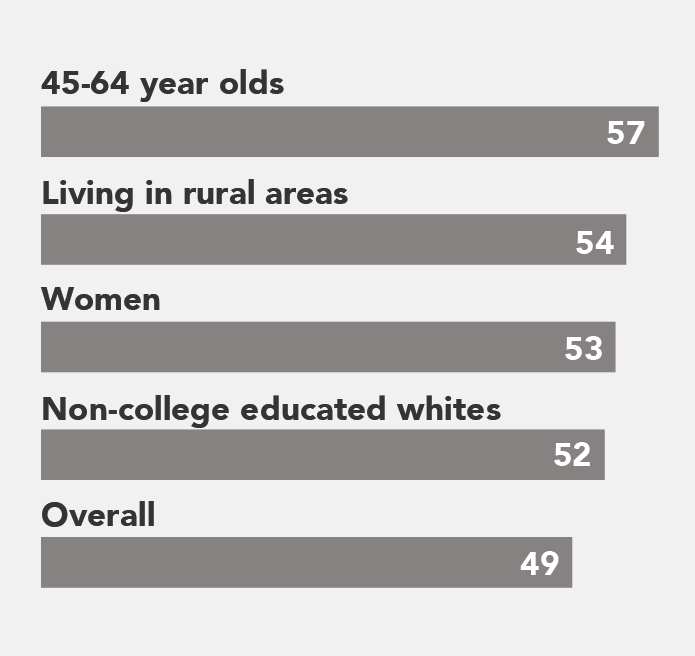
It’s a problem that transcends partisanship.
When asked about the rising costs of living more generally, it breaks down along party lines: Republicans see improvements; Democrats don’t. But when you name specific costs, like gas prices or groceries, Republicans are less positive and the partisan gap is smaller. Health care is the one cost area where affordability is cited as a problem by nearly equal shares of Democrats and Republicans (it is also the only expense cited as “more difficult” by the majority of white Americans without a college degree).
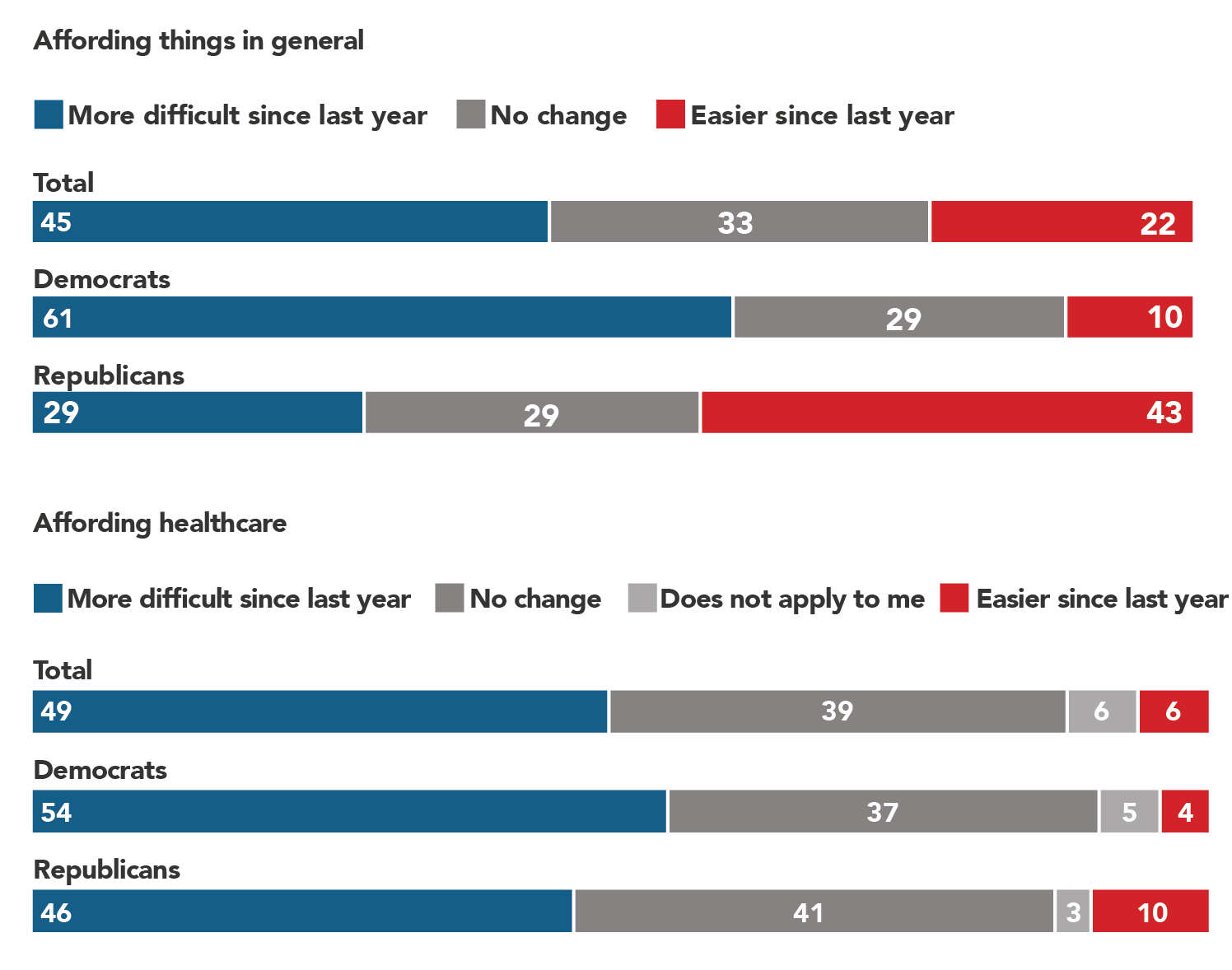
Independents trust Democrats in Congress on the issue.
Respondents – including political independents – trust Democrats in Congress more than Republicans to handle the issue of health care affordability. Democrats lead on the “health care” issue in general, but they lead their Republican counterparts by even bigger margins when it comes to the specific challenges of making health care and prescription drugs more affordable.

3 | Immigration Policy That Violates American Values
Americans have harsh words for the Trump Administration’s policy of taking children from their parents.
One thing is abundantly clear: Americans are strongly opposed to the Trump Administration’s policy of taking children away from their parents at the border.
The policy is widely known, with six in ten Americans saying they have heard “a lot” about it. But it is also overwhelmingly unpopular, with 69% of Americans opposed – and 59% strongly opposed – to separating children from their parents at the border, including nearly all Democrats (94% overall; 87% strongly opposed) but also the vast majority of independents (72% overall; 55% strongly opposed) and a large segment of Republicans (40% overall; 18% strongly opposed). Whites without a college degree are also opposed, by 56% to 40%.
“Cruel” and “inhumane.”
These are the words respondents who oppose family separation say best describe their own concerns about the policy. In describing Americans’ own feelings about the policy, it’s a mix – “disgusted,” “angry,” “upset,” “disappointed,” and “horrified.”
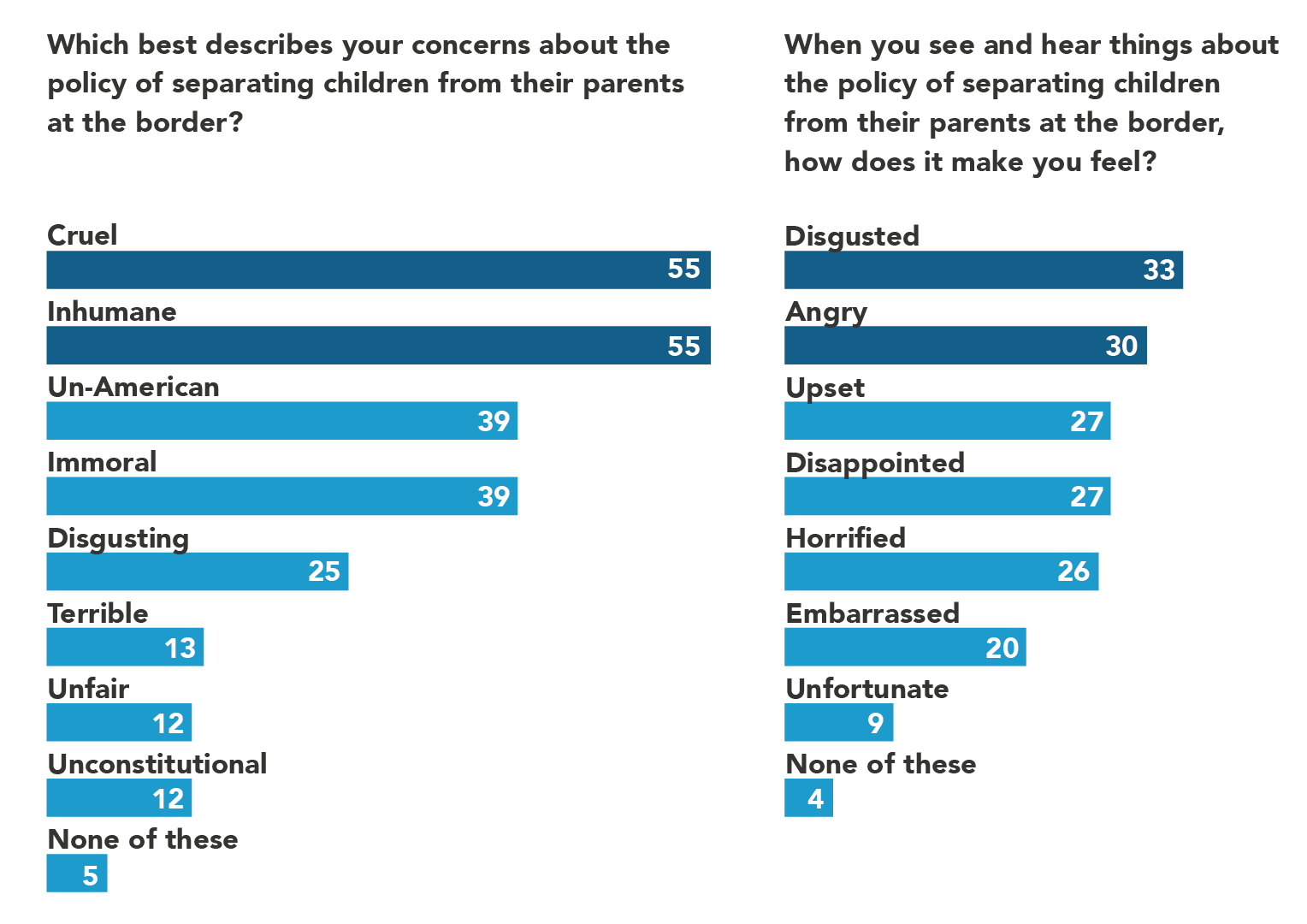
It’s not just “family separation” – it’s “taking away children from their parents.”
Americans who oppose the policy say the latter, more visceral phrase is a better description for why they are worried about what’s happening at the border.
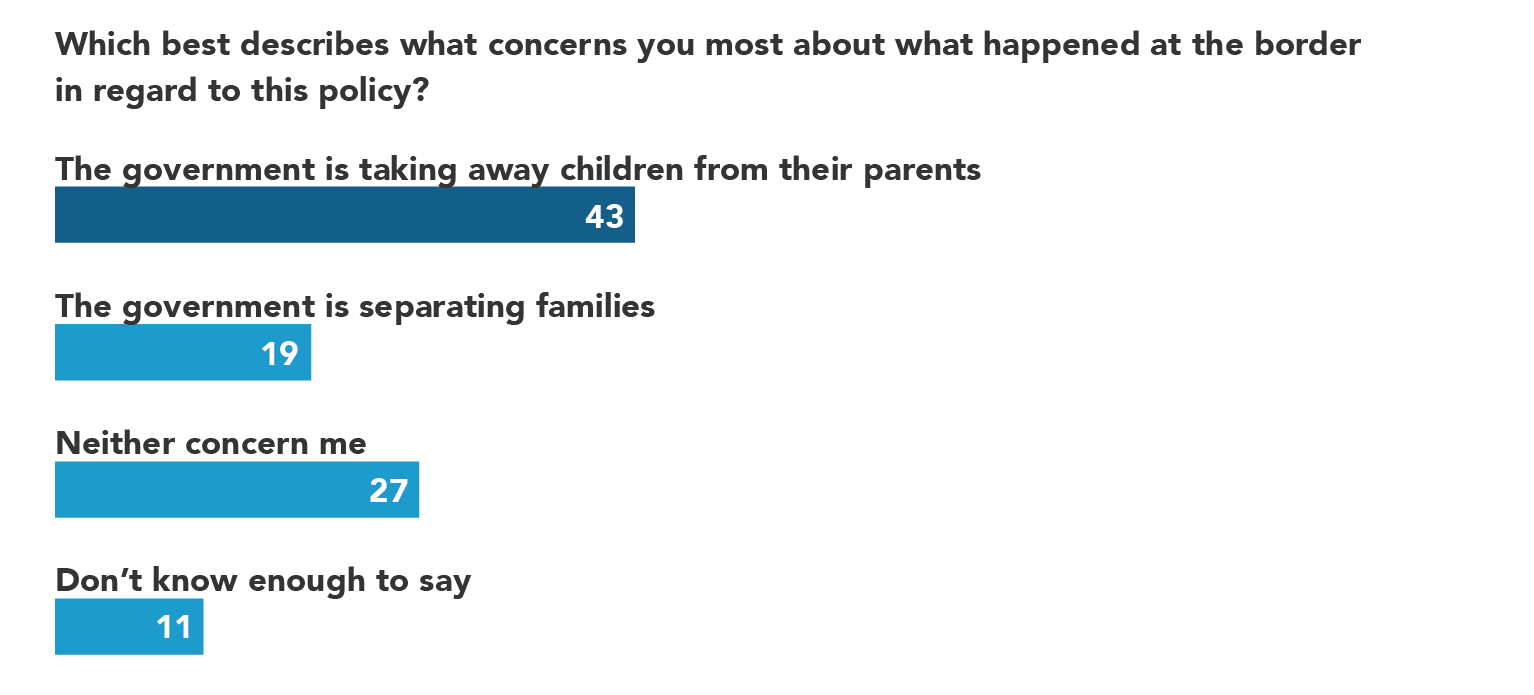
Bonus Points
Manafort in jail, but…
- This month, 53% support the special counsel investigation and 39% oppose it.
- Despite the fact that Trump’s campaign chairman, Paul Manafort, went to jail last month pending his trial, the share of Americans who believe the investigation has uncovered crimes has remained stagnant at 43%. It didn’t break through the noisy news environment enough to raise awareness
- Notably, Manafort himself has not fared well in the public eye. Just half of Americans are familiar with him, but his popularity is decisively underwater, with 44% unfavorable and just 8% favorable.
Gut check
- President Trump’s political style may depend on his ability – or willingness – to speak and act off the cuff, but most Americans (54%) tend to describe his instincts as “bad” rather than “good.”
- Political independents say Trump has bad instincts by 65%-35%.
Don’t pull out of the UN and NATO
- Americans are most concerned about Trump pulling out of the UN (49%) or the security organization NATO (33%), compared to the World Trade Organization (15%) or NAFTA, the North American Free Trade Agreement (18%).
In their own words: what is the best and worst part of the Trump Administration’s policy agenda?
What is the best part of the Trump administration’s policy agenda?
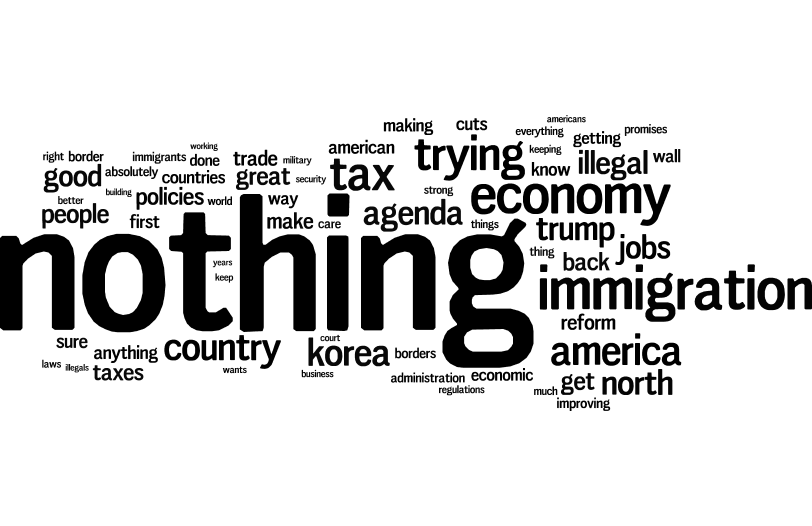
What is the worst part of the Trump administration’s policy agenda?
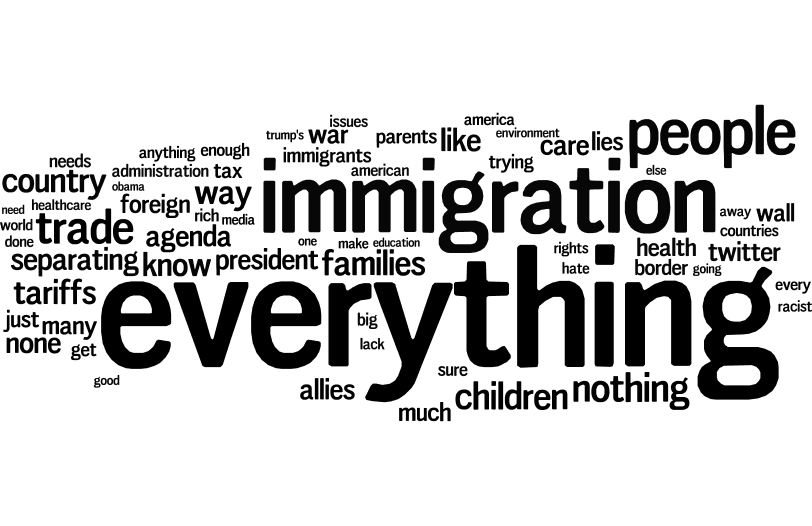
About The Study
Global Strategy Group conducted a public opinion survey among a sample of 1,002 registered voters, between July 6-9, 2018. The survey was conducted online recruiting respondents from multiple opt-in online panel vendors. Respondents were verified against a voter file and special care was taken to ensure that the demographic composition of our sample matched that of national registered voter population across a variety of demographic variables.
